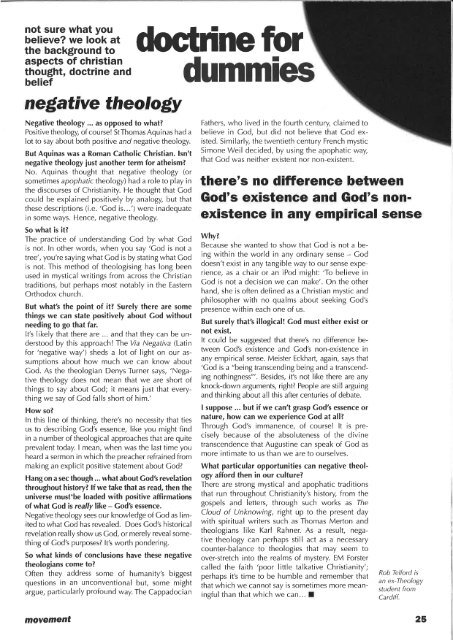Movement 123
Create successful ePaper yourself
Turn your PDF publications into a flip-book with our unique Google optimized e-Paper software.
not sure what you<br />
believe? we look at<br />
the background to<br />
aspects of christian<br />
thought, doctrine and<br />
belief<br />
neglative theolo€y<br />
Negative theology ... as opposed to what?<br />
Positive theology, of course! StThomas Aquinas had a<br />
lot to say about both positive and negative theology.<br />
But Aquinas was a Roman Catholic Christian. lsn't<br />
negative theology just another term for atheism?<br />
No. Aquinas thought that negative theology (or<br />
sometimes apophatic theology) had a role to play in<br />
the discourses of Christianity. He thought that Cod<br />
could be explained positively by analogy, but that<br />
these descriptions (i.e. 'God is...') were inadequate<br />
in some ways. Hence, negative theology.<br />
So what is it?<br />
The practice of understanding Cod by what Cod<br />
is not. ln other words, when you say 'God is not a<br />
tree', you're saying what God is by stating what God<br />
is not. This method of theologising has long been<br />
used in mystical writings from across the Christian<br />
traditions, but perhaps most notably in the Eastern<br />
Orthodox church.<br />
But what's the point of it? Surely there are some<br />
things we can state positively about Cod without<br />
needing to go that far.<br />
It's likely that there are ... and that they can be understood<br />
by this approach! The Vra Negativa (Latin<br />
for 'negative way') sheds a lot of light on our assumptions<br />
about how much we can know about<br />
Cod. As the theologian Denys Turner says, 'Negative<br />
theology does not mean that we are short of<br />
things to say about Cod; it means just that everything<br />
we say of Cod falls short of him.'<br />
How so?<br />
ln this line of thinking, there's no necessity that ties<br />
us to describing Cod's essence, like you might find<br />
in a number of theological approaches that are quite<br />
prevalent today. I mean, when was the last time you<br />
heard a sermon in which the preacher refrained from<br />
making an explicit positive statement about God?<br />
Hang on a sec though ... what about Cod's revelation<br />
throughout history? lf we take that as read, then the<br />
universe must'be loaded with positive affirmations<br />
of what Cod is really like - Cod's essence.<br />
Negative theology sees our knowledge of Cod as limited<br />
to what Cod has revealed. Does Cod's historical<br />
revelation really show us Cod, or merely reveal something<br />
of Cod's purposes? lt's worth pondering.<br />
So what kinds of conclusions have these negative<br />
theologians come to?<br />
Often they address some of humanity's biggest<br />
questions in an unconventional but, some might<br />
argue, particularly profound way. The Cappadocian<br />
doctrine fior<br />
I<br />
I<br />
Fathers, who lived in the fourth century, claimed to<br />
believe in God, but did not believe that Cod existed.<br />
Similarly, the twentieth century French mystic<br />
Simone Weil decided, by using the apophatic way,<br />
that God was neither existent nor non-existent.<br />
there's no difference between<br />
God's existence and God's [onexistence<br />
in any empirical sense<br />
whv?<br />
Because she wanted to show that Cod is not a being<br />
within the world in any ordinary sense - Cod<br />
doesn't exist in any tangible way to our sense experience,<br />
as a chair or an iPod might:'To believe in<br />
God is not a decision we can make'. On the other<br />
hand, she is often defined as a Christian mystic and<br />
philosopher with no qualms about seeking Cod's<br />
presence within each one of us.<br />
But surely that's illogical! Cod must either exist or<br />
not exist.<br />
It could be suggested that there's no difference between<br />
Cod's existence and God's non-existence in<br />
any empirical sense. Meister Eckharl again, says that<br />
'Cod is a "being transcending being and a transcending<br />
nothingness"'. Besides, it's not like there are any<br />
knock-down arguments, right? People are still arguing<br />
and thinking about all this after centuries of debate.<br />
I suppose ... but if we can't grasp God's essence or<br />
nature, how can we experience God at all?<br />
Through Cod's immanence, of course! lt is precisely<br />
because of the absoluteness of the divine<br />
transcendence that Augustine can speak of Cod as<br />
more intimate to us than we are to ourselves.<br />
What particular opportunities can negative theology<br />
afford then in our culture?<br />
There are strong mystical and apophatic traditions<br />
that run throughout Christianity's history, from the<br />
gospels and letters, through such works as The<br />
Cloud of Unknowing, right up to the present day<br />
with spiritual writers such as Thomas Merton and<br />
theologians like Karl Rahner. As a result, negative<br />
theology can perhaps still act as a necessary<br />
counter-balance to theologies that may seem to<br />
over-stretch into the realms of mystery. EM Forster<br />
called the faith 'poor little talkative Christianity';<br />
perhaps it's time to be humble and remember that<br />
that which we cannot say is sometimes more meaningful<br />
than that which we can... I<br />
Rob Telford is<br />
an ex-Theology<br />
student from<br />
Cardiff.<br />
movement 25

















